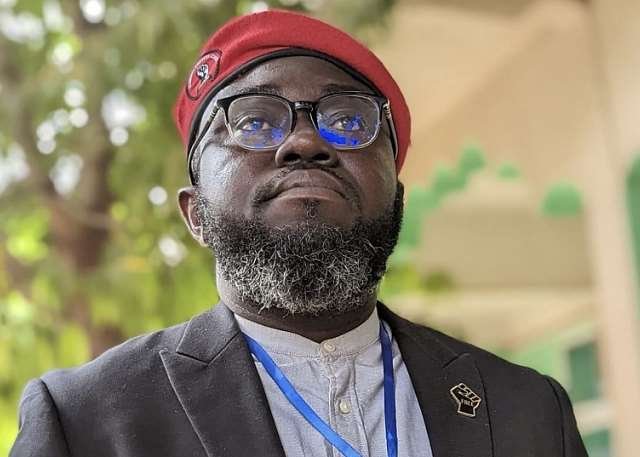News
‘Let children read from books, not digital devices’
Parents have been urged to encourage their children to read from books instead of digital devices to protect their eyes.
This, according to the Country Director of Cure Blindness Project, Dr James Addy, was because exposure of children to digital devices for extended periods puts them at risk of developing eye problems, since prolonged screen time affects eye development, potentially causing vision disorders.
“Parents should implement the World Health Organisation recommendation of zero screen time for children under two years and limited screen time for those above three years. Children’s eyes are sensitive, and prolonged exposure to digital devices can have devastating consequences,” he emphasised.
This came to light in an interview with The Spectator on eye health in Accra on Monday.
Dr Addy explained that excessive screen time can lead to eye strain, dryness, and increased risk of cataracts and refractive errors.
Dr Addy noted that eye problems have become prevalent in Ghana, particularly among children with access to eye care in rural areas limited, exacerbating the issue,” he said.
He recommended regular eye screening, especially in schools and communities, to identify potential issues early because “Early detection and intervention can significantly improve treatment outcomes,” Dr Addy stated.
In Dr Addy view, parents must prioritise personal interactions with children, limiting screen time and encouraging outdoor play while Pre-schools and Daycare Centers should promote toys and outdoor activities over screens.
Globally, over 500,000 people go blind every year, with a prevalence of 0.3 to 1.2 per thousand children. In Ghana, the prevalence is approximately 0.9 per cent, with 44.4 per cent of children requiring refractive services, primarily due to myopia.
The Ghana Blindness and Visual Impairment Study (2015) reported 230,000 people blind in Ghana, including children and adults.
Dr Addy attributed the rising refractive errors among children to lifestyle changes and reduced outdoor activity. “Increased screen time from phones, tablets, computers, and televisions is a significant contributor,” he added.
Consequences of refractive errors include eye strain, blurred vision, retinal detachment, glaucoma, and impaired vision. This can affect education, economic potential, and overall well-being.
Common signs of eye problems in children include squinting, frequent rubbing of the eyes, difficulty focusing on distance objects, and headaches.
Dr Addy recommended regular eye checks, at least once a year, and encouraged parents to prioritise eye health.
To address screen time, Dr Addy advised parents to adopt the 20-20-2 rule which requires that after every 20 minutes, one should look away from the screen and walk around for 2 minutes.
The primary harm from digital tools comes from the distance and light emission. “Prolonged focus on a screen exhausts eye muscles, leading to pain and potential long-term damage,” Dr Addy explained.
By Richmond Angel Mensah
News
Barker-Vormawor granted GH¢20K bail after three-week detention

Convener of the Democracy Hub protest, Oliver Barker-Vormawor has been granted bail to the tune of GH¢20,000 with two sureties.
Barker-Vormawor was arrested along 52 others on Monday, September 23, 2024 and charged for allegedly causing public disturbances during the Democracy Hub protest
He is expected to report to the police twice a week.
He has been charged with counts of stealing, unlawful assembly, unlawful damage, assault on a public officer and offensive conduct conducive to the breach of peace.
He was denied bail by the Accra Circuit Court and further remanded by the High Court when his lawyers appealed the Circuit Court’s ruling.
The High Court judge, who was concerned whether Barker-Vormawor will not commit another offence if granted bail, as he already was on bail for treason felony charges at the time of the alleged offences, warned to grant bail if prosecution fails to commence the trial.
Barker-Vormawor’s lawyers thus repeated the bail application at the High Court, which was granted.
Source: Citinewsroom.com
News
The Electoral Commission of Ghana (EC) has reiterated that its mandate is not to determine or appoint the country’s president.

During a live broadcast of the Inter-Party Advisory Committee (IPAC) meeting on Tuesday, October 15, 2024, EC Chairperson Madam Jean Mensa emphasised that the Commission’s sole responsibility is to declare the choice of the voters, not to influence the outcome.
She assured that the EC will uphold this stance in the upcoming 2024 general elections, reaffirming the Commission’s neutrality and dedication to fairness.
Madam Mensa also called on political parties to refrain from spreading misinformation about the EC’s role, urging them to be clear about the Commission’s limited authority in the election process.
“I would like to quote from Dr Hassan Ayariga’s statement where he said the EC can never make anybody a president, and I think that we all know that around this table. And therefore, we should not peddle misinformation,” she said.
She added, “And peddle false news and disinformation and give the innocent citizens who do not know the process that the Electoral Commission can make somebody a President. I would like to quote from Dr Hassan Ayariga’s statement that the EC can never make anybody a President.
“What the EC does is to declare who the voters choose as their President. And so, it’s the Ghanaian voter who votes a president into being and not the EC that makes a President. We only declare the voter’s choice. And that is what will happen come December 2024. It’s who the voter wants to be President of this land who will be declared by the EC,” she concluded.
Source: Citinewsroom.com







